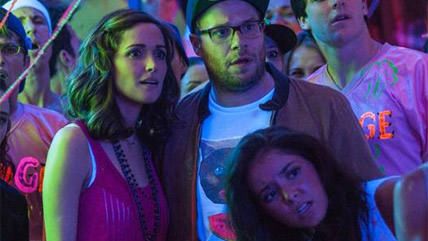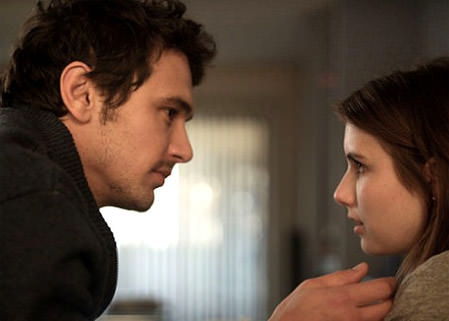Demented Excess and More in Chef, Neighbors, and Palo Alto
Food porn, frat boys, and teenage wasteland revisited


Jon Favreau's new comedy, a sort of food-porn road trip, is as light as a soufflé but solid as a plate of ribs. (No more food similes, promise.) The movie is ambling and digressive, but it's consistently funny, and at several points—as when Robert Downey Jr. glides in for a five-minute spin and just kills it—it's hilarious.
Carl Casper (Favreau) was once a bright young star on the L.A. food scene. Now he's stuck in a stuffy old-school restaurant, chained to a cliché menu–snoozy scallops, stodgy French onion soup—imposed by the eatery's owner, Riva (Dustin Hoffman). When word arrives one day that an influential food blogger named Ramsey Michel (Oliver Platt) will be coming in that night, Carl decides to assemble a more adventurous bill of fare to show what he can really do. Riva forbids it, though, ordering his chef to stick with the "greatest hits." Michel arrives, sneers at the food, and posts a withering review, which goes viral on Twitter. Carl has no idea what Twitter is.
With Chef, Favreau appears to be taking a time-out in his blockbuster career (he directed the first two Iron Man movies and, alas, the sneered-at sci-fi misfire Cowboys & Aliens) in order to return to his roots in indie films like Swingers and Made. Writing and directing again, he has devised a colorful story and populated it with a top cast, including Iron Man stars Downey and Scarlett Johansson (as the restaurant's front-room manager Molly), John Leguizamo (in one of his giddiest performances, as Carl's motor-mouth line cook Martin), and Emjay Anthony, who plays Carl's 10-year-old son Percy with a precocious restraint that's only minimally reliant on kid-actor cuteness.
The movie opens with a flurry of vegetable-chopping and pig-sectioning, and great-looking food is front-and-center throughout the rest of the film, from carne asada to croque monsieur. Carl's Cuban ex-wife Inez (Sofia Vergara) wants him to stop working for other people and get his own gourmet food truck. Carl resists this down-market idea, but on a trip to Miami, where Carl got his start, he gives in when Inez' other ex-husband (Downey) agrees to provide the truck. This vehicle turns out to be a wreck, and Favreau spends a little too much time showing us how Carl, assisted by Percy and Martin, whips it into shape.
But the movie takes off along with Carl and company when they hit the road, heading back to L.A., but with stopovers in New Orleans and Austin. Soon we're treated to compact show-and-tells about beignet-making at the Café du Monde and brisket-smoking at the celebrated Franklin Barbecue. (Unfortunately, there's also a poky blues-band bar scene that could have been cut with no loss to the film.) But the father-son story at the heart of the picture is never eclipsed by all the great eats on display. Carl, an affectionate but distracted father, is finally bonding with his son in the food world Carl loves, and Percy—a grill-man in the making—is happily chronicling their cross-country trip with a steady stream of online photo and Vine postings.
Favreau is admirably uninterested in taking cheap shots at his more prickly characters. Restaurant owner Riva may be a culinary stick in the mud, but he's running a business; and as Carl tells Molly, while beef cheeks may be a better dish than tired old ahi tuna, regular people—the customers on whom Riva depends—just don't want it. Platt's food critic is depicted with similar nuance—his Ramsey Michel isn't just a snotty destroyer, he's a food-loving pro who's honestly affronted by unimaginative grub. (Platt's performance is no doubt informed by the fact that his brother, Adam Platt, is the well-known food critic of New York magazine.) But Favreau may be scoring a point of his own against critics in general with a fiery confrontation in which Carl berates Michel for what he feels was his unnecessarily cruel review: "It hurts!" Carl cries.
Chef is sunny and cheerful, and it motors along on a lively score of Latin dance tracks and Crescent City funk. The movie doesn't go out of its way to win your heart, but by the end—the happy end, of course—it has.
Neighbors

The setup, from which all else naturally flows: Mac and Kelly (Seth Rogen and Rose Byrne), happily married but restless, are ensconced in their new house, with a new baby, when a college fraternity moves in next door. And not just any fraternity–back in the mists of collegiate ridiculousness, Delta Psi Beta was the frat that invented the toga party! Or so legend has it. Anyway, nightly eruptions of thunderous debauchery soon begin, and Mac and Kelly are steamed. They're grownups—they like brunch, they like hand-soap dispensers. They need sleep, and so does their tot. But they're also conflicted: as one-time party animals themselves, they don't want to be seen as pathetic scolding oldies. So how to fight back?
In the annals of arrested-development movies, Neighbors manages something at least a little bit new. The frat bros on hand here provide all the usual gross-a-rama–dick jokes, dildo gags, and so forth, much of it drunken, some of it wonderfully disgusting (if anything can still be said to be so). But the focus is on Mac and Kelly. They may still smoke the occasional joint, but their full-tilt 'shroom years are quickly receding, and by the end of the picture, they realize they're okay with that.
Director Nicholas Stoller (Forgetting Sarah Marshall, The Five-Year Engagement) skillfully interweaves the stupid and the semi-serious, and Seth Rogen knows the drill, of course—he virtually invented it. But the movie has two surprises. The first is Rose Byrne, whose Kelly is just as reluctant as her husband to leave their youthful high times behind, and who can lapse back into vintage nuttery as quickly as he can. Byrne gets a lot of comedy time here—including a completely unhinged breast-milking scene—and she paces Rogen (who's pretty great, as usual) every step of the way.
The movie's other surprise—a big one, to me—is Zac Efron, who plays fraternity president Teddy Sanders. Teddy is a man for whom the way of the party is a sacred obligation—he can't conceive of a grownup life beyond college. Efron, with his fiercely chiseled abs and lasery blue eyes, is absurdly hunky to begin with; but here he uses his familiar physical assets to project a near-demonic hedonism that's sometimes hysterical. He's up for anything (witness his pee-duel with Rogen) and he has exhilarating comic timing (his rap battle on the theme of "bros before hos" is priceless). He's an actor headed in a new direction, and he appears to be loving it.
Amid all the demented excess on view (the frat even has a disco ball in its backyard party garden), there's strong comedy support by Lisa Kudrow, as the seen-it-all dean of the college, and Ike Barinholtz (The Mindy Project), as Mac's lunky best bud. Stoller also walks in some familiar faces (Christopher Mintz-Plasse, Andy Samberg) just to remind us what party we're at, and pop-culture references flow like spilled beer (J.J. Abrams and Kevin James are among the many shoutouts, and the big bash to which everyone comes dressed as a Robert De Niro character is really inspired). The frat-boy festivities may come to an end—as they must, right?—but the best parts rage on in your head.
Palo Alto

Palo Alto takes us back to the familiar cinematic precinct of teenage wasteland, where we find that little has changed: the kids still fritter away their abundant free time chugging booze, smoking pot, and hooking up, while the grownups make themselves scarce. Since the genre dates back at least to the 1950s, it's fair to wonder whether another trudge through this well-worn terrain is really necessary. But Gia Coppola's movie has a dreamy look and a couple of striking performances, so the answer, in this case, is yes.
Directing her first feature, Coppola—granddaughter of Francis Ford, attentive niece of Sofia—has fashioned a script from a book of short stories by the inexhaustible James Franco, a son of prosperous Palo Alto and onetime wasted teen himself. The movie is a loosely structured observation of four high-school students: the virginal April (Emma Roberts), sensitive Teddy (Jack Kilmer), Teddy's walking-time-bomb pal Fred (Nat Wolff), and lovelorn Emily (Zoe Levin), the designated school slut. Also figuring in is Mr. B (Franco), a single dad who coaches the girls' soccer team, lures its members to babysit his little boy, and then hits on them once he has them alone in his house. A few other parental figures pass through (Chris Messina has a disturbing scene as a secretly gay father, and there's a bizarre cameo by Val Kilmer, actor Jack's dad), but they're background to the kids' drifting lives.
April is attracted to Teddy, who like her is artistically inclined. They talk at a party, but can't seem to connect. When she sees him being led upstairs for a quick servicing by Emily, she wanders away for some impersonal snogging of her own. Teddy is on probation for a DUI bust, doing community service at a local library. It's his last chance to straighten up, but he can't shake his affection for Fred, who's nothing but trouble. (Fred says things like, "If I was gonna kill myself, I'd take a lot of other people with me." When feeling bored, he drives his car into a wall.) April is babysitting for Mr. B when he comes home from a date and suddenly kisses her. "Sorry," he says, with plausible sincerity. "That's okay," says April. Then she kisses him back.
None of these kids know what they want, which lends them a persuasive illusion of authenticity. They're not dumb, but they sometimes do dumb things, and then just move along to whatever life has in store for them next. Coppola, a photographer with a background in fashion videos, has an eye for the telling shot and the wrenching moment. ("Tell me you love me," Emily pleads after a crude carnal encounter with Fred. Fred just walks away.) She also has a familial affinity for plush, carefully graded color, which is beautifully realized by cinematographer Autumn Durald.
The director also draws spare, intimate performances from her actors. Roberts, always impressive in some new way, plays April as a young woman who knows she's probably screwing up, but figures it's not the end of the world: she's young, she's confused—and? Franco, of whom it might be thought we see far too much lately, is back at his best here, taking a character who might have been written off as a simple creep—preying on pretty students half his age—and penetrating to the core of Mr. B's own emotional confusion: is he a full-on lecher, or just a deeply misguided romantic?
But the cast standout, in his first film role, is Kilmer, whose gentle star quality turns recessive indecision into something worth watching. His Teddy never seems to learn, never realizes how dangerous his relationship with Fred really is. "Why do you have to try so hard to be crazy?" he asks—as if Fred needs to try. Teddy can't even formulate the questions that might stabilize his rudderless life, and there might be no answers in any case. By the end, though, it looks like there could at least be hope.


Show Comments (8)